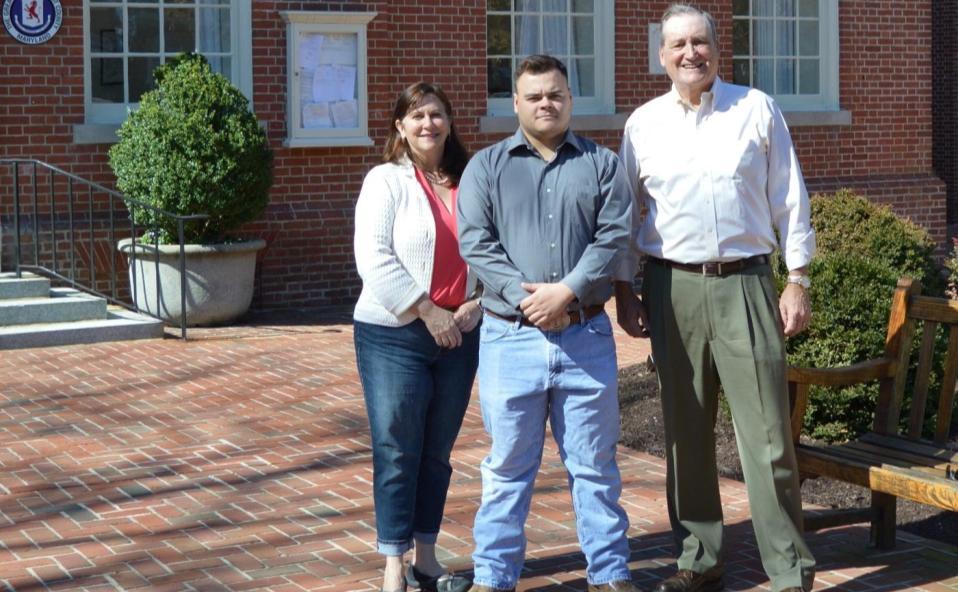Did you know that among Talbot County teens, who commit a crime and participate in the Teen Court Program, the recidivism rate is less than 10 percent?
Teen Court, which started in 1999 in Talbot County, is a program that is run by teens for teens. It is a voluntary diversion program that allows a first time offender to be judged by a jury of his/her peers rather than having his or her case heard by the Juvenile Court. The program is offered to Talbot County teens ages 13 through 17 who are attending school. All parties must agree with diversion and admit involvement in the incident. Of the 30 to 40 cases a year, 50 percent of the cases heard in Talbot County involve underage possession of alcohol or marijuana.

Pictured L-R are Jayne Fitzgerald, new Teen Court Coordinator and Executive Director of Talbot Partnership; Nick White, a past participant in Talbot County’s Teen Court Program; and Bob Coleman, previous Teen Court Coordinator for Talbot County.
For Nick White of Easton, who started in the Teen Court Program over eight years ago while in eighth grade at Easton Middle School, the program was a reality check. He comments, “I stole a soda. The leaders of Teen Court had the biggest influence on me. They were someone who was not family. Specifically, Bob Coleman, Teen Court Coordinator at the time, was a role model for me.”
Cases are referred to Teen Court by the local law enforcement agencies, the school system, and the Maryland Department of Juvenile Services. Students receive a letter from the Teen Court Coordinator which schedules an informal meeting to discuss Teen Court and the suitability for the case. At the meeting, Teen Court personnel explain Teen Court, and answer any questions. If the student elects to continue with Teen Court, a Court date is set up. If they decide not to continue with Teen Court, the case is referred to the Department of Juvenile Services.
White went on to participate in the ROTC Program, serve as the head judge in Teen Court, and graduate from Easton High School with awards, before enlisting and serving in the Marine Corps. He feels the program gave him the people skills and charisma to become a judge in the Teen Court Program by his senior year – which was not an easy accomplishment. White, who went on to have a successful career in the Marine Corps, has recently come home and is working and serving his local fire department.
He adds, “The Teen Court Program gives students a second chance to change their behavior and students don’t have a record if they make a mistake.”
Teen Court cases are presented to a teen jury for determining sanctions for the offender. Among some of the cases heard in Talbot County are second degree assaults, thefts under $1000, and cyber bullying. After careful consideration of the facts and circumstances, the jury determines a fair and appropriate disposition. Disposition can consist of 8 to 60 hours of community service and one to four jury duties. A jury may also mandate that the youth attend educational programs, write apology letters and/or essays. The respondent then has 60 days to complete their sanctions. If the youth fails to complete their sanctions, their case is referred to the Department of Juvenile Services where a petition may be filed for formal action. Only one to two cases a year don’t follow through with their sanctions.
Bob Coleman, who served as Talbot County’s Teen Court Coordinator for six years, states, “Nick was impulsive. Part of my mentoring was getting him to settle down and get his responsibilities done.”
He adds, “The youth offender is before a jury of his or her peers which has a bigger impression than regular court would have on them. It has an amazing effect on being accountable.”
The goals of the Teen Court Program are to reduce the number of youth in Juvenile Court, encourage youth to take responsibility for their actions and make them aware of consequences, utilize peer pressure to make the experience more meaningful, ensure youth receive fair and just disposition, educate youth about the judicial process, provide a productive community service activity, and to balance the needs of victims, the community, and respondents.
According to Coleman, another benefit of the program is that the youth offender meets new people from the school when he or she serves on the Teen Court jury, which is part of the consequences of their actions. This exposes the teens to people with different ideas from them and can have long-lasting effects.
Community partners of the Teen Court Program are the Maryland Department of Juvenile Services, Talbot County Board of Education, Circuit Court of Talbot County, Talbot Family Network – Local Management Board, Talbot County Health Department, Talbot Partnership, Mid-Shore Pro-Bono, and Mid-Shore Mediation.
Coleman adds, “Teen Court speaks for itself as to the positive impact it has on the youth of our county.”
For Nick White, who has completed his time in the Marine Corps, serving in Okinawa, Japan and Korea, he continues to take with him the lessons he learned in Teen Court.
Talbot Partnership is the fiscal agent for the Teen Court Program. For further information, contact Jayne Fitzgerald, executive director of Talbot Partnership for the Prevention of Substance Abuse, at 410-819-8067. Talbot Partnership is located at 8 Goldsborough Street, Easton, MD 21601.



Write a Letter to the Editor on this Article
We encourage readers to offer their point of view on this article by submitting the following form. Editing is sometimes necessary and is done at the discretion of the editorial staff.